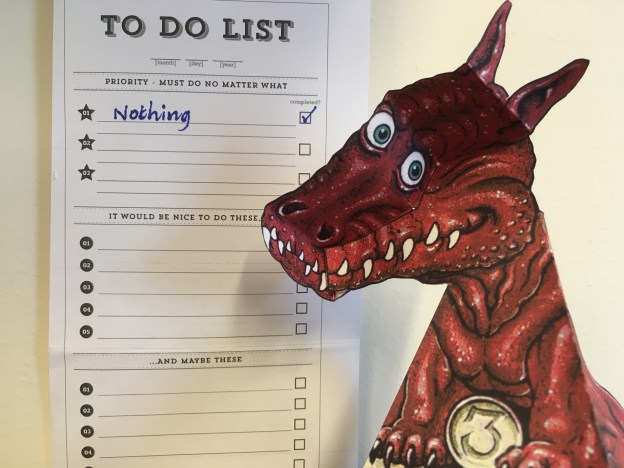If you know Marie Kondo’s book The Life-changing Magic of Tidying Up, you’ll guess that this post is going to address cleaning and tidying. And so it is – but through the lens of a fundamental principle of the Alexander Technique: non-doing.
In my early twenties I was shamefully messy. I was living in an apartment in London, trying to cobble together a living as a freelance guitarist, a university lecturer, and a guitar teacher in three or four different schools. Every job was at least an hour away by public transport. Like many musicians, I had yet to learn that perfect is the enemy of good,
so there was always more to do and the day never seemed done.
I paid the price in my energy levels. Sometimes I would come back from central London and lie down on my bed, unable to move. For the most part I just prepared my concerts and my classes and let the mess accumulate around me. Eventually, the day would come when I could stand it no longer and I would do a big clean up.
Except that one day I could stand it no longer – but I didn’t have the energy to do anything about it. I lay on my bed, going back and forth in my mind between my exhaustion and the chaos around me, getting only more exhausted by the trap I was in. I can’t carry on in this mess; I can’t do anything about this mess.
And then a third option came to my mind: if you can’t clean up, fine; just don’t do anything to add to the mess.
And so when I was rested enough to make dinner, I didn’t touch the unwashed dishes, or clear away empty packages, or sort through the mess of books and papers, or pick up clothes. I just made dinner and washed and put away only the dishes I had just used. And after working with some books, I picked them up and returned them to the shelf.
I opened a letter and was about to let the torn envelope rest forgotten on the table when I remembered my new rule: do not do anything to add to the mess. So I picked it up and put it in the trash, and as I did, I noticed another torn envelope on the floor. Who on earth put that there?
Who indeed? I could not imagine what kind of person would let an envelope fall to the floor like that. No matter; let’s pick it up and put it in the trash as well.
Within a couple of days the apartment was totally clean and tidy.
To this day, whenever I get stuck, I come back to this experience. In this parallel, it is pretty obvious what the mess is that needs tidying: myself.
Changing our patterns of movement takes time. Gradually we learn how to recoordinate ourselves so that when something feels tight or painful, we can make a change, but there are always going to be days when nothing seems to help – there is, in other words, nothing to be done.
Let’s say that I have a painfully tight shoulder. I might say to myself, Whatever this tightness is, I won’t add to it by tightening it yet more. Or: I won’t tighten it any more than I have to.
In that moment, I’m not changing my shoulder, but something much more important – my attitude. Whatever chain of reaction I’m caught up in that is affecting my poor shoulder, I’ve stepped outside it. And perhaps in that moment my shoulder starts to quieten down and my back starts to widen.
More examples:
- I’m walking to work. My steps seem heavy, but I can’t pinpoint the cause. I don’t want to add to the heaviness.
- I’m nervous about the performance I’m about to give. I don’t want to add to the nervousness.
- My breathing is tight. I don’t want to add to the constriction.
If you’re interested in talking with yourself in this way, there are many ways ways of phrasing it, each with its own effect. You can say, “I don’t have to tighten my shoulder any more than it already is.” “I don’t have to add to the tension in my shoulder.” “I am free not to make my shoulder any tighter.” And so on. If something is helpful to you, I’d love to hear about it in the comments.

This is indeed very helpful. I can apply that principle to being in bed with the ‘flu. It really helps. Together with listening to Pema Chordron. Thanks for this well timed blog!
LikeLike
Thank you, Magdalena. Applying it to being ill is especially challenging, but I suppose I felt in pretty bad shape in the experience I recounted. I hope you are over your flu now!
LikeLike
Very good Jonathan! I’m reminded of one of Marjory Barlow’s helpful comments: “We’re always trying to make things better, whereas really we should just be trying to not make them worse. “
LikeLiked by 1 person
Thank you, John. That comment from Marjory Barlow is very helpful. I finally read her book with Trevor Allan Davies and found it very inspiring. I appreciate you taking the time to read this and I’m glad to see your new posts.
LikeLike
Enjoyed this colourful story as an analogy to awareness non doing getting out of the way and allowing the right thing to do itself.
LikeLike
Thank you, Jennifer. And I guess I couldn’t come to any of that until I literally couldn’t try to put things right directly.
LikeLike